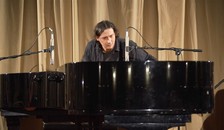
Dino Rešidbegović (1975, Bosnia and Herzegovina) acquired his BA and MA degrees in composition at the Conservatory of the Music and Arts University of the City of Vienna, in the classes of H. K. Gruber, Wolfgang Liebhart, and Rainer Bischof. He also holds a piano degree from the Vienna Conservatory. In 2005, he acquired a post-MA degree in composition at the University of Music and Performing Arts Vienna, in the class of Detlef Müller Siemens. At the same institution, he also studied conducting, with Uroš Lajovic. He acquired his doctoral degree in composition at the Music Academy of the University of Sarajevo under the supervision of Igor Karača. Rešidbegović has won the Alban Berg Award, Siemens AG Österreich Award, and Theodor Körner Prize. He is currently employed as an associate professor at the Composition Department of the Music Academy in Sarajevo. He is a permanent member of the Austrian Composers’ Society (ÖKB). His works have been performed in Italy, Croatia, Serbia, Slovenia, Germany, Ireland, Switzerland, Japan, Bosnia and Herzegovina, Austria (at the Musikverein), and the US (in Washington, DC and at Carnegie Hall in New York).
Concerto for flute, processors, and tape (2018)
Concerto for flute, processors, and tape represents the composer’s intention to modify or modulate sound in real time. The title of the piece does not refer to the traditional concertante formal structure, but to the relationship between the flute and the electronics, which symbolise the “orchestra”. The flute’s signal is the source of sound-modulation processes in real time, which the performer dictates by manually controlling at the same time different links between sound processors. The tape constitutes the instrument section within the conception of “orchestra”, which performs the role of the accompaniment, while, considered separately, it also constitutes an exclusively electronic piece, realised in the form of recorded modulation processes of analogue modular sound synthesisers.


